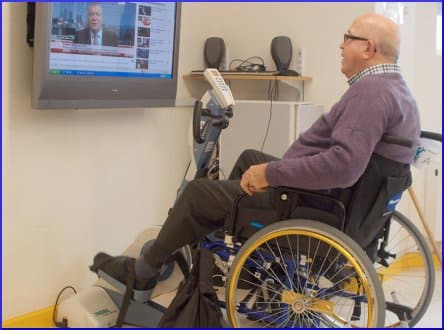
Yesterday, Childhood Obesity News mentioned the decreased life expectancy of TV addicts, office workers, and other sedentary people. “Sedentary” is, of course, the dirty nine-letter word referred to in our title, and the habit or necessity of long-term sitting turns out to be an insidious hidden killer. The effects of immobility can be grim.
Gretchen Reynolds reported for The New York Times on a study with nearly 250,000 participants. That’s almost a quarter of a million. These subjects were questioned, measured, and tested over an eight-year period by the National Cancer Institute. The information collected concerned their time spent sitting at a computer or watching TV or commuting, and their exercise habits, and their health in general. Reynolds says:
At the start of the study, none suffered from heart disease, cancer or diabetes. But after eight years, many were ill and quite a few had died. The sick and deceased were also in most cases sedentary.
In other words, with such a large sample, science feels pretty comfortable about connecting the dots between a sedentary lifestyle and serious illness, leading often to an early grave. The gentleman in the photo on this page might very well be suffering from the effects of too much sitting still, over the years. Now he is under doctor’s orders to exercise as best he can, in a wheelchair, with the pedal machine. He has an excuse for watching TV. But given the choice, the likelihood is high that he would rather be up and walking around.
A healthier world
If all televisions had treadmills in front of them, the world would be a better place. What if each person made a rule for herself or himself, to never watch a TV show or a movie unless doing some exercise at the same time? While this practice would not single-handedly solve the obesity epidemic, there would no doubt be a massive overall improvement in health.
For office workers, expected to sit at desks, staying in motion might be more challenging. A treadmill desk might cause more typos, and audible breathing could cause the person on the other end of a phone call to wonder what on earth is going on.
The Mayo Clinic’s Dr. James Levine once consulted with a company that manufactures treadmill desks (from which he receives no profit). While 60,000 of those have gone out into the world, of course, for many work environments, the notion is just too extreme. But maybe they should get with the program. It is Dr. Levine’s belief that “even regular and zealous gym workouts can’t undo the damage” done by long periods of daily sitting.
Australian study
Gretchen Reynolds also wrote about a study from Melbourne’s Baker IDI Heart and Diabetes Institute. On different days, volunteers followed prescribed regimes, which included sitting still for seven hours; or getting up every 20 minutes for a two-minute walk (not run) on a treadmill; or “jogging gently” during comparable break times.
Remaining sedentary for seven hours in a row proves to be a stress on the body. The blood sugar levels go up and the insulin levels are not what they should be. The good news is, those two-minute mild exercise breaks are enough to keep blood sugar levels stable. Interestingly, the Australian study showed that jogging doesn’t improve blood sugar equanimity any more than walking.
Indeed, this observation about the usefulness of merely being upright is reinforced by results from a University of Massachusetts study showing, Reynolds says:
… [W]hen volunteers stood all day — nothing else; no walking or jogging; just standing — they burned hundreds more calories than when they sat for the same period of time.
(To be continued…)
Your responses and feedback are welcome!
Source: “Don’t Just Sit There,” The New York Times, 04/28/12
Source: “Obesity expert says daily workouts can’t undo damage done from sitting all day,” NBCNews.com, 01/09/13
Image by NCVO London.

 FAQs and Media Requests:
FAQs and Media Requests: 











